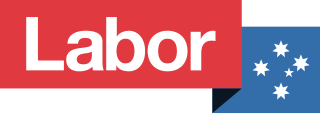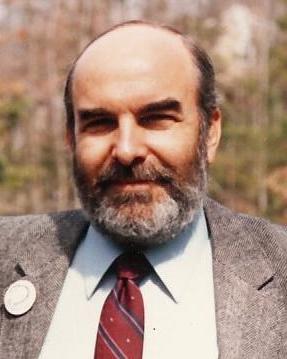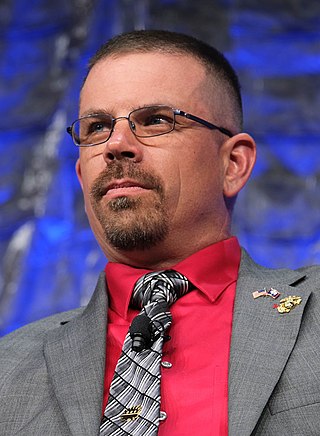
The Australian Labor Party (ALP), also commonly known as the Labor Party or simply Labor, is the major centre-left political party in Australia and one of two major parties in Australian politics, along with the centre-right Liberal Party of Australia. The party has been in government since being elected at the 2022 federal election, and with political branches in each state and territory, they currently form government in New South Wales, Queensland, South Australia, Victoria, Western Australia, the Australian Capital Territory, and the Northern Territory. As of 2023, Tasmania is the only state or territory where Labor forms the opposition. It is the oldest continuous political party in Australian history, being established on 8 May 1901 at Parliament House, Melbourne, the meeting place of the first federal Parliament.
The Green Party of the United States (GPUS) is a federation of Green state political parties in the United States. The party promotes green politics, specifically environmentalism; nonviolence; social justice; participatory democracy; grassroots democracy; anti-war; anti-racism; eco-socialism. On the political spectrum, the party is generally seen as left-wing. As of 2023, it is the fourth-largest political party in the United States by voter registration, behind the Libertarian Party.

The Libertarian Party (LP) is a political party in the United States that promotes civil liberties, non-interventionism, laissez-faire capitalism, and limiting the size and scope of government. The party was conceived in August 1971 at meetings in the home of David F. Nolan in Westminster, Colorado, and was officially formed on December 11, 1971, in Colorado Springs. The organizers of the party drew inspiration from the works and ideas of the prominent Austrian school economist, Murray Rothbard. The founding of the party was prompted in part due to concerns about the Nixon administration, the Vietnam War, conscription, and the introduction of fiat money.

Andrew Verne Marrou is an American politician who served in the Alaska House of Representatives from the 5th district as a member of the Libertarian Party from 1985 to 1987. He was the Libertarian vice-presidential nominee in the 1988 election and presidential nominee in the 1992 election.

The Libertarian Party of Washington (LPWA) is the state-affiliate of the national Libertarian Party in the state of Washington, the third-largest political party in the state and country.
The Libertarian National Committee (LNC) controls and manages the affairs, properties, and funds of the United States Libertarian Party. It is composed of the party officers, five at-large representatives elected every two years at the national convention, and a theoretical maximum of 10 regional representatives. The current chair is Angela McArdle, elected at the 2022 Libertarian National Convention.

The Libertarian Party of New Hampshire (LPNH) is the New Hampshire affiliate of the national Libertarian Party (LP). Active since its foundation in 1972, it is the third-largest political party in the state having had multiple members elected to the New Hampshire House of Representatives as well as being ballot-qualified multiple times.

The Libertarian Party of Oregon is a political party representing the national Libertarian Party in the U.S. state of Oregon. It is organized as a minor party for state election law, and recognized by the Oregon as a statewide nominating party.
The Libertarian Party of Delaware (LPDE) is the Delaware affiliate of the national Libertarian Party. It was founded in 1975.
The Libertarian Party of the United States was formed in Colorado Springs in the home of Luke Zell by a group of individuals led by David Nolan on December 11, 1971, after several months of debate among members of the Committee to Form a Libertarian Party, founded July 17. The formation was prompted in part by price controls and the end of the Gold Standard implemented by President Richard Nixon. The Libertarian Party viewed the dominant Republican and Democratic parties as having diverged from what they viewed as the libertarian principles of the American Founding Fathers. This group included John Hospers, Edward Crane, Manuel Klausner, Murray Rothbard, Roy Childs, D. Frank Robinson, Theodora (Tonie) Nathan, and Jim Dean.

Nicholas Joel Sarwark is an American attorney and businessman who served as the 19th chair of the Libertarian National Committee (LNC), the governing body of the Libertarian Party. Prior to his election in 2014, he served on several LP national committees and as chair of the Libertarian Party of Maryland State Committee and vice chair of the Libertarian Party of Colorado State Committee. As of 2020, he is the only LP chair to have served three consecutive terms.

The 2020 Libertarian Party presidential primaries and caucuses were a series of electoral contests to indicate non-binding preferences for the Libertarian Party's presidential candidate in the 2020 United States presidential election. These differ from the Republican or Democratic presidential primaries and caucuses in that they do not appoint delegates to represent a candidate at the party's convention to select the party's presidential nominee.

The 2018 Libertarian National Convention was held from June 30 to July 3, 2018, in New Orleans, Louisiana. According to the Libertarian Party, the 2018 convention was the "biggest Libertarian National Convention ever," breaking previous records in attendance and fundraising.

The 2022 United States Senate election in Oregon was held on November 8, 2022, to elect a member of the United States Senate to represent the state of Oregon.
The Libertarian Party of Wyoming (LPWY) is the affiliate of the US Libertarian Party (LP) in Wyoming, headquartered in Riverton. As of 2021 it was the third-largest political party in Wyoming by voter registration, with a share of votes cast that has exceeded 5%.

Marshall A. Burt is an American politician who served in the Wyoming House of Representatives. A member of the Libertarian Party, Burt represented the 39th district from 2021 to 2023. Burt is the first Libertarian candidate to be elected to a state legislature since Steve Vaillancourt in 2000, and the first third-party candidate elected to the Wyoming Legislature in over 100 years. Burt was defeated by Republican Cody Wylie in the 2022 Wyoming House of Representatives election.

The 2024 Libertarian Party presidential primaries and caucuses are a series of current electoral contests to indicate non-binding preferences for the Libertarian Party (LP) presidential nominee in the 2024 presidential election. These differ from the Republican or Democratic presidential primaries and caucuses in that they do not appoint delegates to represent a candidate at the party's convention to select the party's presidential nominee. The party's nominee will be chosen directly by registered delegates at the 2024 Libertarian National Convention, scheduled to take place from May 24 to 26, 2024 in Washington, D.C.

The Libertarian Party Mises Caucus (LPMC) is a caucus within the Libertarian Party in the United States that promotes paleolibertarianism, as well as a more radical version of American libertarianism associated with the presidential campaigns of former U.S. congressman Ron Paul. It was founded in 2017 by Michael Heise, mainly in opposition to Nicholas Sarwark's position as party chairman and the pragmatic faction of the party associated with the presidential campaigns of former New Mexico Governor Gary Johnson. It is named after economist Ludwig von Mises.

Angela Elise McArdle is an American politician from Texas and California who was elected on May 28, 2022 as the 22nd and current chair of the Libertarian National Committee. She was also the Secretary of the Libertarian Party of California from April 2018 to April 2019, and was a board member of the Mises Caucus.

The Keystone Party of Pennsylvania is a third party in Pennsylvania founded in 2022 with a focus on political solutions through the electoral process.















